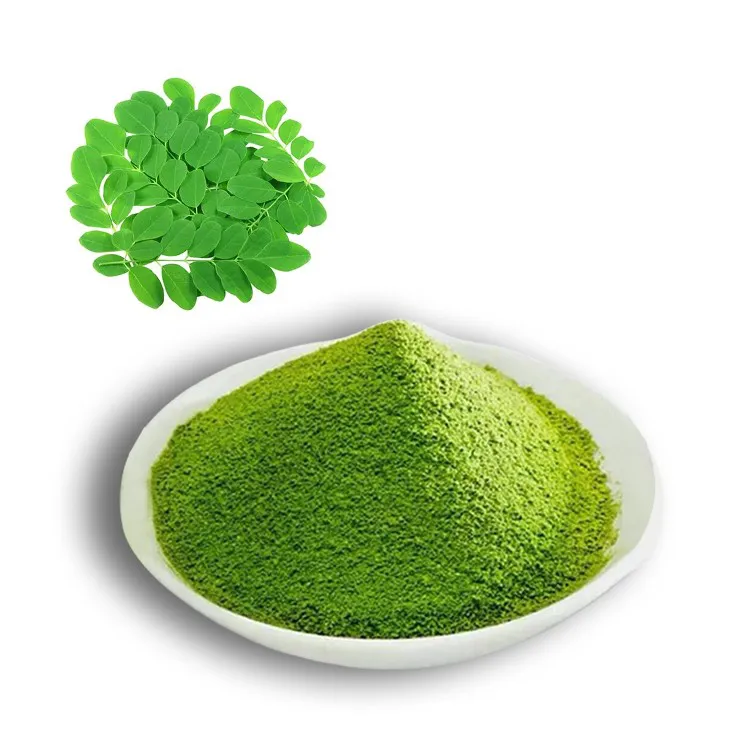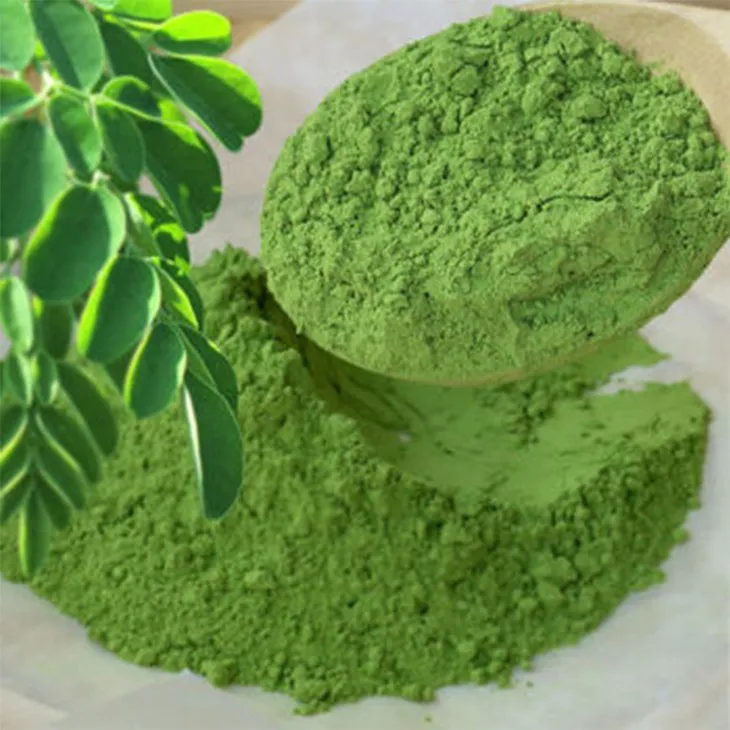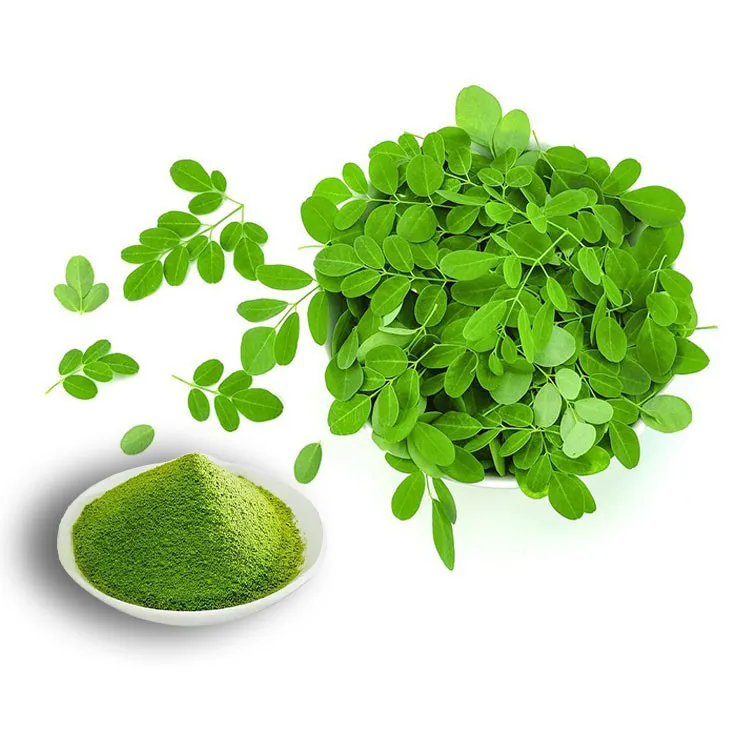- 0086-571-85302990
- sales@greenskybio.com
Extract moringa powder by steam distillation.
2024-11-27

1. Introduction to Moringa oleifera
Moringa oleifera is a remarkable plant that has gained significant attention in recent years due to its numerous high - value components. Native to parts of South Asia, it has been cultivated in many tropical and subtropical regions around the world. The plant is often referred to as the "miracle tree" because of its diverse uses in various industries, including health, cosmetics, and food.
The leaves, pods, seeds, and even the bark of Moringa oleifera are rich in nutrients such as vitamins (e.g., vitamin A, vitamin C, and various B - vitamins), minerals (including calcium, potassium, and iron), and essential amino acids. These components make it a valuable ingredient for nutritional supplements, functional foods, and natural cosmetics.

2. The Basics of Steam Distillation
Steam distillation is a separation process that has been widely used in the extraction of essential oils and other valuable substances from plants. The principle behind steam distillation is based on the fact that the vapour pressure of a mixture of two immiscible liquids (in this case, water and the volatile components in Moringa oleifera) is equal to the sum of the vapour pressures of the individual components.
When heat is applied to the Moringa material in the presence of water, steam is generated. The steam then passes through the plant material, causing the volatile compounds to vaporize. These vapours, along with the steam, are then condensed and collected. Since the volatile components have different boiling points from water, they can be separated from the water during the condensation process.

3. The Steam Distillation Process for Moringa powder Extraction
3.1. Preparation of the Moringa Material
Before the steam distillation process begins, the Moringa oleifera material needs to be properly prepared. This typically involves harvesting the appropriate parts of the plant, such as the leaves or seeds. The harvested material is then washed thoroughly to remove any dirt, debris, or contaminants.
Once cleaned, the Moringa material may be dried partially or completely, depending on the specific requirements of the extraction process. Drying helps to reduce the moisture content, which can affect the efficiency of steam distillation.
3.2. The Steam Generation and Distillation Setup
A steam generator is an essential component of the steam distillation setup. This can be a simple boiler or a more sophisticated device that is capable of producing a consistent supply of steam. The steam is then introduced into the distillation chamber, which contains the prepared Moringa material.
The distillation chamber is designed to ensure proper contact between the steam and the plant material. It is usually made of stainless steel or other non - reactive materials to prevent any chemical reactions that could affect the quality of the extracted powder. The steam passes through the Moringa material, and the volatile components are vaporized.
3.3. Condensation and Collection
After the vapours are generated in the distillation chamber, they are then passed through a condenser. The condenser cools the vapours, causing them to condense back into a liquid state. This liquid contains both water and the extracted components from the Moringa oleifera.
The condensed liquid is then collected in a receiver. At this stage, the water and the Moringa - derived substances are still in a mixed state. Further separation processes may be required to obtain the pure Moringa powder.

4. The Science Behind Steam and Moringa Interaction
When steam comes into contact with the Moringa oleifera material, several physical and chemical processes occur. The heat transfer from the steam to the plant material causes the temperature of the Moringa to increase. This increase in temperature activates the volatile compounds present in the plant, making them more likely to vaporize.
The steam also acts as a carrier for the volatile components. As the steam passes through the Moringa, it sweeps up the vaporized compounds and carries them out of the plant material. The interaction between the steam and the Moringa is influenced by factors such as the temperature and pressure of the steam, as well as the porosity and surface area of the plant material.
5. Quality and Purity Aspects of the Extracted Moringa powder
The quality and purity of the extracted Moringa powder are of utmost importance, especially when it is intended for use in sensitive applications such as the health and food industries.
5.1. Purity Considerations
During the steam distillation process, efforts are made to ensure that the extracted powder is free from contaminants. This includes removing any residual water, non - volatile plant matter, and other impurities. One way to improve purity is through multiple distillation cycles or by using advanced separation techniques such as centrifugation or filtration.
Another aspect of purity is the absence of harmful substances. Since Moringa oleifera may be grown in different environments, there is a possibility of it absorbing pollutants from the soil or air. The extraction process should be designed to eliminate any such potential contaminants.
5.2. Quality Indicators
Quality indicators for the extracted Moringa powder include the concentration of its active components. For example, the levels of vitamins, minerals, and amino acids should be within the expected range for high - quality Moringa powder. The powder should also have a consistent texture and colour, which can be affected by factors such as the extraction method and the quality of the raw material.
Furthermore, the stability of the powder over time is an important quality factor. This involves factors such as its resistance to oxidation and microbial growth, which can be influenced by packaging and storage conditions.
6. Implications for the Health Industry
Moringa oleifera has been associated with various health benefits, and the extraction of Moringa powder by steam distillation has important implications for the health industry.
The high - quality Moringa powder obtained through steam distillation can be used in the production of dietary supplements. These supplements can provide consumers with a concentrated source of the plant's nutrients, such as vitamins and minerals. For example, Moringa powder can be a valuable source of iron for individuals with iron - deficiency anaemia.
Research has also suggested that Moringa oleifera may have antioxidant, anti - inflammatory, and antimicrobial properties. The extraction of pure Moringa powder by steam distillation allows for the isolation and concentration of these beneficial compounds, which can be further studied and incorporated into pharmaceutical products.
7. Implications for the Cosmetics Industry
In the cosmetics industry, Moringa oleifera is highly regarded for its potential to improve skin and hair health.
The extracted Moringa powder can be used in the formulation of skincare products. Its rich nutrient content, such as vitamins A and C, can help to nourish the skin, reduce the appearance of wrinkles, and improve skin elasticity. Moringa powder can also be used in haircare products, where it may help to strengthen hair follicles, reduce hair breakage, and add shine to the hair.
Steam - distilled Moringa powder is preferred in the cosmetics industry because of its purity. This ensures that the final products are safe for use on the skin and hair, without causing any irritation or allergic reactions.
8. Implications for the Food Industry
The food industry can also benefit from the extraction of Moringa powder by steam distillation.
Moringa powder can be added to a variety of food products as a functional ingredient. It can enhance the nutritional value of foods, such as breakfast cereals, smoothies, and baked goods. For example, adding Moringa powder to a smoothie can increase its vitamin and mineral content, providing a more nutritious option for consumers.
However, strict quality and safety regulations must be followed when using Moringa powder in the food industry. The purity and stability of the powder are crucial factors to ensure that the final food products are safe and of high quality.
9. Conclusion
Steam distillation is a valuable method for extracting Moringa oleifera powder. It offers a way to obtain a high - quality, pure product with a wide range of applications in the health, cosmetics, and food industries.
The process involves careful preparation of the Moringa material, proper steam generation and distillation, and effective condensation and collection. Understanding the science behind the steam - Moringa interaction is key to optimizing the extraction process and ensuring the quality and purity of the extracted powder.
As the demand for natural and nutritious products continues to grow, the extraction of Moringa powder by steam distillation is likely to play an increasingly important role in meeting these market needs.
FAQ:
What is the principle of steam distillation in extracting moringa powder?
The principle involves using heat to generate steam. The steam then interacts with the moringa material. Components in the moringa are volatilized with the steam. As the steam - component mixture cools, the moringa powder can be separated and collected. This process takes advantage of the different volatilities of the substances within the moringa.
What are the main advantages of using steam distillation for moringa powder extraction?
One advantage is that it can effectively separate the desired powder from other substances in the moringa. It helps in maintaining the quality and purity of the extracted powder. Also, it is a relatively gentle method compared to some harsher chemical extraction methods, which can preserve the valuable components of moringa better for applications in health, cosmetics, and food industries.
How does steam distillation affect the quality of the extracted moringa powder?
Steam distillation can enhance the quality in several ways. It can remove impurities that may be present in the raw moringa material. By carefully controlling the distillation process, the valuable components of moringa are retained in the powder. The resulting powder is likely to have a higher concentration of the desired substances, which is beneficial for its use in various industries.
What are the applications of the moringa powder extracted by steam distillation in the health industry?
The moringa powder can be used in dietary supplements. It may contain nutrients such as vitamins, minerals, and antioxidants. These can contribute to overall health, for example, by boosting the immune system, improving digestion, or providing energy. It may also have potential therapeutic properties for certain health conditions, although more research is often needed.
How pure can the moringa powder be after steam distillation?
The purity of the moringa powder after steam distillation can be relatively high. However, it depends on various factors such as the quality of the starting moringa material and the precision of the distillation process. With proper control, it can be purified to a significant extent, reducing the presence of unwanted substances and increasing the concentration of the beneficial components specific to moringa.
Related literature
- Steam Distillation of Moringa: A Comprehensive Study"
- "The Science Behind Moringa Powder Extraction by Steam Distillation"
- "Quality Aspects of Steam - Distilled Moringa Powder"
- ▶ Hesperidin
- ▶ citrus bioflavonoids
- ▶ plant extract
- ▶ lycopene
- ▶ Diosmin
- ▶ Grape seed extract
- ▶ Sea buckthorn Juice Powder
- ▶ Beetroot powder
- ▶ Hops Extract
- ▶ Artichoke Extract
- ▶ Reishi mushroom extract
- ▶ Astaxanthin
- ▶ Green Tea Extract
- ▶ Curcumin Extract
- ▶ Horse Chestnut Extract
- ▶ Other Problems
- ▶ Boswellia Serrata Extract
- ▶ Resveratrol Extract
- ▶ Marigold Extract
- ▶ Grape Leaf Extract
- ▶ blog3
- ▶ blog4
-
Super Essence of Natural Lemon Extract.
2024-11-27
-
Organic Hawthorn Powder Suppliers.
2024-11-27
-
Organic cocoa extract of trace components.
2024-11-27
-
The best - quality vitamin K2.
2024-11-27
-
Diosmin
2024-11-27
-
Sugarcane Extract
2024-11-27
-
Genistein
2024-11-27
-
Coconut Water Powder
2024-11-27
-
Alisma Extract
2024-11-27
-
Artichoke Leaf Extract
2024-11-27
-
Black Rice Extract
2024-11-27
-
Yellow Pine Extract
2024-11-27
-
Clove Powder
2024-11-27
-
Hops Extract
2024-11-27





















